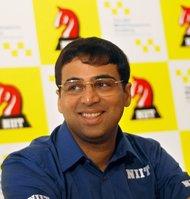A Conversation With: Chess Champion Viswanathan Anand
The New York Times – April 3, 2013
It would not be exaggerating to call Viswanathan Anand a chess legend.
Mr. Anand, India’s first grandmaster, has been undisputed world champion since 2007 and has successfully defended the title three times. He also is the winner of six Chess Oscars, an annual award given to the world’s most outstanding player in the opinion of chess journalists and other top players.
Mr. Anand is also the first recipient of the highest sporting honor for an Indian, the Rajiv Gandhi Kel Ratna award, which he received for the calendar year 1991-92.
In addition to his game, the Chennai native has been actively involved in the N.I.I.T. Mind Chess Academy to promote chess across India, and his work has helped incorporate chess as part of the curriculum for almost 1.7 million elementary school students in India.
Mr. Anand, who divides his time between Chennai and Madrid, spoke to India Ink recently about his work with the academy and the role that it plays in empowering children across India.
Q. Your partnership with N.I.I.T. for the Mind Chess Academy has been seen as a trailblazing combination. Why do you think chess has to be a part of every child’s life?
A. It is indeed a healthy activity since it trains certain skills, including problem solving and remembering patterns. It helps you to focus on a problem for a while and cope with other areas. There are studies which show that chess players become successful in their lives down the line, so it does have a positive impact on children in the long term also.
Q. How did this academy initiative begin? Was it part of your grander vision for chess in India when you started it in 2002?
A. It started in 2002 when N.I.I.T., my sponsor, was excited about this idea since they could see a strong connect between education and chess. I wanted to give back to the game which has brought me so many laurels. We decided to focus on creating a mass movement in creating chess awareness in the country and create “Mind Champions” so that they could use it for the rest of their lives.
Our goal was to create this awareness, and if chess talent emerged as an offshoot, we were more than happy with this. Now there are about 1.7 million students in 17,000 schools who are exposed to Mind Chess Academy.
Q. How does the academy work?
A. We provide chess centers in schools across the country with infrastructure, such as books for them to use. We don’t provide training in all centers, but this provides them the exposure to the game. The students pick up from there and keep learning the game by being exposed to it.
Q. What is your particular role in nurturing this program besides being the face and mascot of it? Do you actively participate?
A. I serve as primarily the mascot of the academy and try to leverage my stature to spread the game as much as possible. I also try to interact with schools and principals directly at times, to push them to give chess more exposure in their schools. In addition, I also look at the basic chess curriculum of the chess academy so that it caters to the levels of students. Besides this, I travel extensively across India including states in the northeast such as Assam to promote the academy.
Q. Have you seen an exponential increase in chess talent in the country as a ripple effect?
A. Yes, I think so. The awareness of the game, besides improving students’ academic skills, has also led to an increase in chess talent in the country. Even though our main goal was awareness first, this link to produce more chess talent is there. I am glad of this development.
Q. What are some of the positive outcomes of this program besides learning chess? For example, has it improved the levels of math among students?
A. There are positive outcomes across academic subjects including math. For example, we did a study with 8,000 students and teachers who were exposed to the N.I.I.T. Mind Chess Academy. Almost all of them saw improvements in the students’ academic performance because of their exposure to chess.
Q. The states of Gujarat and Tamil Nadu have made chess compulsory for primary school students. What role did you or the academy play in convincing these states on the benefits of chess to kids?
A. I am ecstatic at this development. It is indeed a great step by these states, and it is likely to have a great impact for the game across the country. I did interact with the states to highlight the potential of chess for students. In Gujarat, we had the world record of largest number of chess games in a single venue — 20,500 — and in Tamil Nadu, I have been emphasizing on the positives of chess to the authorities. So I am happy that they have done this.
Q. What are some of the plans for the program? Do you plan to expand it worldwide?
A. Yes, there are plans to expand. We recently have introduced the Academy in Dubai, Botswana and South Africa especially after working with the governments of the latter two countries. My idea is to have the epicenter in India because of the N.I.I.T. network and also to give back to my country. Beyond that, I am willing to expand if we get partners such as N.I.I.T. to spread the message of the game across the world.
This interview can also be viewed at http://india.blogs.nytimes.com/2013/04/03/a-conversation-with-chess-champion-viswanathan-anand/

